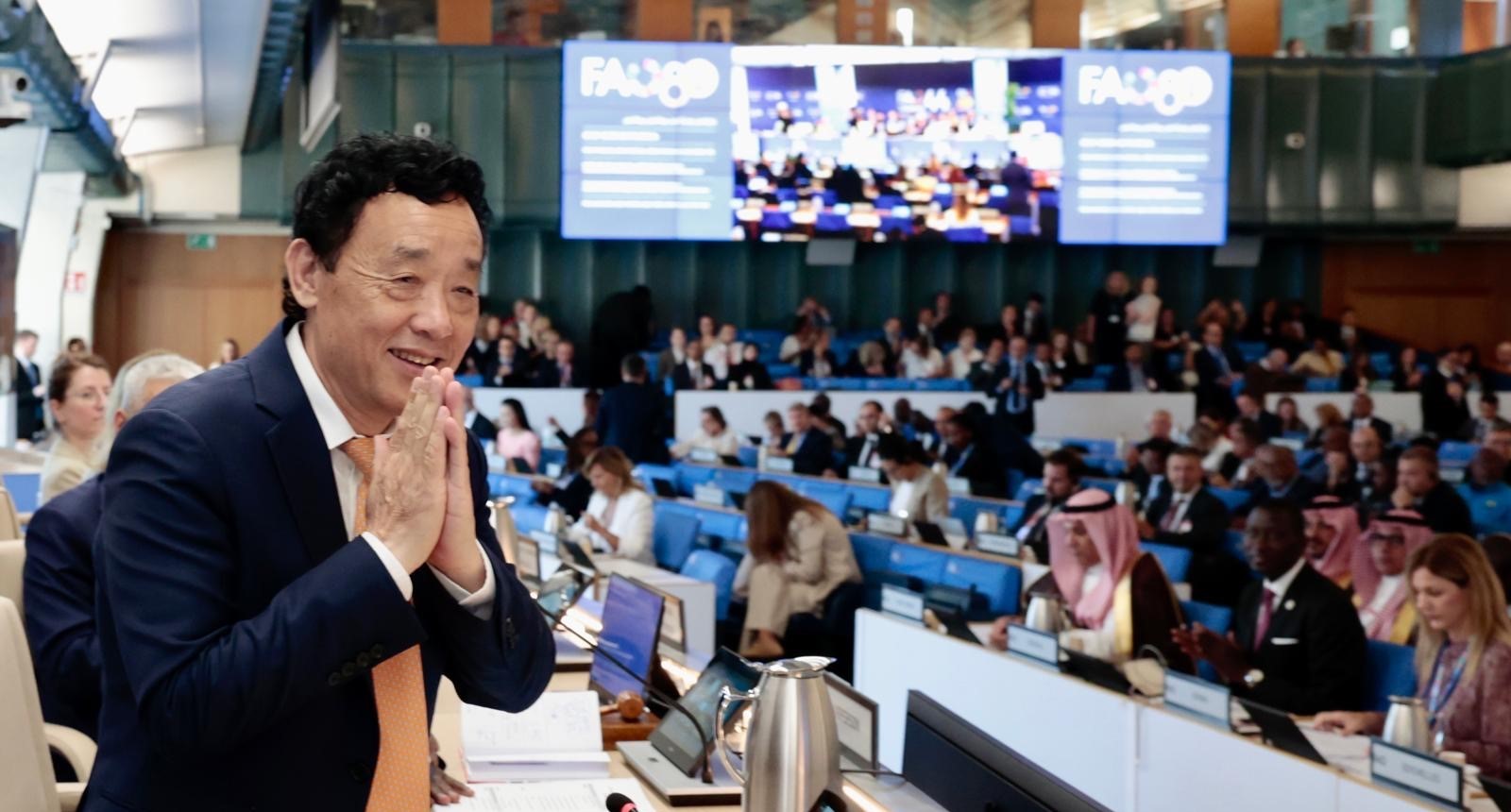FAO Director-General urges hope, collective action and genuine multilateralism
At the 44th Session of FAO Conference, QU Dongyu stresses the need to move beyond rhetoric to nourish people, protect the planet, and empower communities

Director-General QU Dongyu greets the 44th Session of FAO Conference.
©FAO/Pier Paolo Cito
Rome – The Director-General of the Food and Agriculture Organization of the United Nations (FAO), QU Dongyu, delivered today his opening statement at the 44th Session of FAO Conference (28 June – 4 July), highlighting that humanity is at a “unique inflection point” where hope, action and genuine multilateralism are essential to tackle interconnected challenges.
Qu stressed the necessity of moving beyond rhetoric and called for collective will, dedication, and passion from all Members, partners, and stakeholders to tackle interconnected global challenges and transform them into opportunities.
“The very foundations of global agrifood systems are being tested,” he said. “This Conference is our global time – where ambition must meet strategy, where innovation must scale rapidly, and where solidarity must translate into tangible actions and solutions.”
The Conference, which is FAO’s paramount governing body and meets every two years, began on Saturday 28 June with the election as Chairperson of Mabouba Diagne, Minister for Agriculture, Food Sovereignty and Livestock of Senegal, and the McDougall Lecture by Philemon Yang, President of the 79th United Nations General Assembly.
Throughout the week, FAO Members will discuss the Organization’s priorities and the proposed Programme of Work and Budget for 2026-2027.
Takeaways from the Director-General’s address
In his speech to the Conference, the Director-General outlined FAO's ongoing commitment to value efficiency and operational excellence, particularly in light of a challenging funding environment.
Noting that “tightening resources leads to difficult decisions to be made,” Qu said he has since his first day in the job sought to make sure FAO is agile and adaptable and results-driven, and now ready to focus on high-impact initiatives that maximize return on investment.
“Key to this is maximizing technical competencies and expertise in the core areas of work of the Organization and leveraging transformative partnerships to fully harness the resources, expertise, and innovative potential available,” he said.
The Director-General outlined initiatives he has piloted in his six years at FAO’s helm and priorities for his two final years as Director-General. He showcased some of FAO’s tangible impacts, pointing to the deployment of drones, robotics and precision-farming technologies in more than 50 countries, and more than $2 billion invested in seed systems and crop diversity in more than 20 countries. Some 136 countries have now adopted FAO’s ePhyto digital solutions and more than 50 have benefited from normative advice on better pest, fertilizer and pesticide management.
In the past 12 months, FAO has supported the design of 65 public investment projects approved by international financial institutions in 46 FAO Member countries for an investment value of $9 billion, he said, adding that “public finance must act as a catalyst to crowd in responsible private investment.”
Qu identified key approaches to maintain and grow FAO’s impact:
--Focus on what FAO does best: normative work, data and statistics, technical and specialized expertise;
--Show measurable impact across the Four Betters – better production, better nutrition, a better environment and a better life; and
--Deepen partnerships – both traditional and new – to extend our reach and maintain the delivery of critical technical services, life-saving emergency responses, and essential normative work.
Director-General Qu noted significant overhauls of FAO – which this year celebrates its 80th anniversary – during his tenure, ranging from a significant physical restructuring of headquarters to signature initiatives such as the Hand-in-Hand Initiative, the successful creation of the World Food Forum, and the final effort to make the Organization’s Decentralized Offices Network modern and efficient to achieve more impactful results at the country level.
He also noted that FAO will soon propose a new innovative mechanism to bolster the Organization’s acclaimed work in preventing, preparing for and responding to future pandemics caused by transboundary animal diseases, which has been impacted by resource cuts.
“We are service providers” and Members, farmers and consumers are FAO’s true clients, he said.
“Let this 44th Session (of FAO Conference) be remembered as the moment we saw hope amid difficulties, and we collectively chose a positive approach, with forward thinking and real multilateralism,” Qu said. “Let us continue with our common original aspiration to think, learn, and contribute together for the benefit of our Organization, humanity and our planet… never giving up until our mission is accomplished.”
“This Conference is our opportunity to harness this momentum – to transform 'what if' into 'how we can,'” he declared, inspiring collective action toward building resilient agrifood systems that nourish people, protect the planet, and empower communities.
A full version of the Director-General’s remarks is available here.
Other speakers
In a message to the Conference read by Monsignor Fernando Chica Arellano, Permanent Observer of the Holy See to the United Nations Food and Agriculture Agencies in Rome, Pope Leo XIV praised the Director-General’s stewardship of FAO and its initiatives “to put an end to the scandal that is hunger in the world.”
The Pope lamented the role of conflicts in increasing food insecurity, often through direct attacks on food production and distribution that he described as a sanctionable and “cheap way to wage war,” and emphasized that overcoming hunger will depend on sharing.
Hans Hoogeveen, the outgoing Independent Chairperson of the FAO Council, gave a farewell speech in which he emphasized that the world is “completely off track” to meet the goal of food security for all and leaving no one behind and warned of a growing global humanitarian crisis. He said that public funding will almost certainly decline over the next few years, making it imperative that FAO be creative to find additional resources. “FAO is more needed than ever,” he said.
Contact
FAO News and Media (+39) 06 570 53625 [email protected]
Christopher Emsden FAO News and Media (Rome) (+39) 06 570 53291 [email protected]
